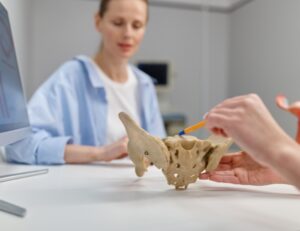The pelvic floor plays a crucial role in supporting the organs within the pelvis, including the bladder, uterus, and rectum. When the muscles and connective tissues of the pelvic floor become weakened or dysfunctional, it can lead to various issues such as urinary incontinence, pelvic organ prolapse, and pelvic pain. In this blog, we’ll explore ways to prevent and treat pelvic floor dysfunction to maintain optimal pelvic health.
Understanding Pelvic Floor Dysfunction
Pelvic floor dysfunction refers to a range of conditions that affect the pelvic floor muscles and connective tissues. Common symptoms may include urinary or fecal incontinence, pelvic pain, discomfort during intercourse, and pelvic organ prolapse. Factors such as pregnancy and childbirth, aging, obesity, chronic constipation, and certain medical conditions can contribute to pelvic floor dysfunction.
Preventing Pelvic Floor Dysfunction:
- Maintain a Healthy Weight: Excess weight can put pressure on the pelvic floor muscles, leading to weakness and dysfunction. Adopting a balanced diet and engaging in regular exercise can help manage weight and support pelvic floor health.
- Practice Pelvic Floor Exercises: Pelvic floor exercises, also known as Kegel exercises, can help strengthen the muscles of the pelvic floor. These exercises involve contracting and relaxing the pelvic floor muscles to improve tone and function.
- Practice Good Bowel Habits: Chronic constipation and straining during bowel movements can strain the pelvic floor muscles. Ensure adequate fiber intake, stay hydrated, and establish regular bowel habits to prevent unnecessary stress on the pelvic floor.
- Maintain Proper Posture: Poor posture can contribute to pelvic floor dysfunction by placing additional strain on the muscles and connective tissues. Practice good posture habits, especially when sitting for extended periods.
- Avoid Heavy Lifting: Heavy lifting can strain the pelvic floor muscles and increase the risk of pelvic organ prolapse. Use proper lifting techniques and avoid lifting heavy objects whenever possible.
Treating Pelvic Floor Dysfunction:
- Pelvic Floor Physical Therapy: A pelvic floor physical therapist can provide personalized exercises and techniques to strengthen and rehabilitate the pelvic floor muscles. This may include biofeedback therapy, manual therapy, and therapeutic exercises.
- Medications: In some cases, medications may be prescribed to manage symptoms such as urinary incontinence or pelvic pain associated with pelvic floor dysfunction.
- Behavioral Therapies: Behavioral therapies such as bladder training and bowel retraining can help improve bladder and bowel control in individuals with pelvic floor dysfunction.
- Minimally Invasive Procedures: For cases of pelvic organ prolapse or urinary incontinence that do not respond to conservative treatments, minimally invasive procedures such as pelvic floor reconstruction or sling procedures may be recommended.
- Surgery: In severe cases of pelvic floor dysfunction, surgical intervention may be necessary to repair or reinforce the pelvic floor muscles and address associated issues such as pelvic organ prolapse.
Maintaining optimal pelvic floor health is essential for overall well-being and quality of life. By adopting preventive measures such as maintaining a healthy weight, practicing pelvic floor exercises, and practicing good bowel habits, individuals can reduce their risk of pelvic floor dysfunction. For those experiencing symptoms of pelvic floor dysfunction, seeking timely evaluation and treatment from a healthcare provider specializing in pelvic health is crucial for effective management and improvement of symptoms.










